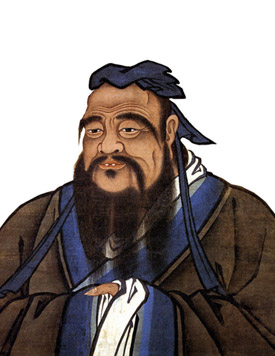Home >> Culture Watch
| To Understand Confucianism |
|
chinadaily 2013-10-31 |

Peng Yongjie If we regard Confucian culture as an independent research object, then there is some most noteworthy progress on the construction and development of Confucian culture in the last decade, such as the fever for classics reading—including the reading of Confucian classics, the endeavors in the reconstruction of Confucianism ( 儒教), and those heated discussions based on Confucian theories in political philosophy. The progress in these aspects, however, is beset with numerous academic and non-academic disputes, which need to be studied, responded to and clarified academically.
I The debate over Confucianism has persisted for a long time. It had already existed since the time when Kang Youwei tried to advocate Confucianism in his attempt to save Confucian culture, which was rapidly losing its institutional protection. At that time, the debate over “saving the country” or “saving Confucianism” intertwined with the debate over “which culture is better-Chinese or Western”. In addition, among the academic researches in the past few decades, Confucianism was the subject of much debate. If according to Karl Marx’s idea that “Religion is the opium of the people”, then the discussion about whether Confucianism is a religion is similar to putting it on trial for “historical crimes”. In this sense, Confucianism was not only equivalent to feudal despotism and a “man-eating institution”, but was also “the opium of the people”. Its crimes thus could be counted as legion. In this sense, the discussion about whether Confucianism was a religion, was no longer pure academic, and took on a political complexion. While the political complexion has died out, the academic circle has still been subject to its impact. For example, some Chinese Indonesians were extremely disappointed when they invited several Confucian scholars from their mother country to help them make Confucianism a legal religion in Indonesia. These scholars, on the contrary, unanimously gave the answers that were opposite to their expectation. However, among the numerous discussions on Confucianism that emerged again at the end of the last century, the academic circle’s attitude toward Confucianism changed a lot as the understanding of the religion evolved. Some scholars identified Confucianism as a spiritual and humanizing religion and recognized its value. Those discussions were carried out mainly through the review of Confucian culture and its history. Later, at the beginning of the new century, the revival and reconstruction of Confucianism and the re-institutionalization of Confucian culture have been explicitly raised by some Confucian scholars, triggering another round of discussions. These discussions also included a large amount of retrospective study of Confucian culture and its history, yet they were more explicit and clear in regard to the construction of Confucian culture and its implementation in real life. Currently, since the discussions on Confucianism involve both the realistic concern and the individual cultural recognition, some people have rejoiced and some others have worried about the “reconstruction of Confucianism”.
Among all those discussions, some are not so much discussions as a show of hands. Such statements are often heard: I am in favor of religionizing Confucianism, or I am opposed to religionizing Confucianism. It seems Confucianism, as a religion already in existence and still in development, turns into something that waits for our approval or disapproval. Or it seems as if that Confucianism is something ready to be born, or more exactly, we are discussing whether or not it should come into this world. So didn’t we feel it inappropriate to make such statements? As a matter of fact, Confucianism is an important way to promote the development and the transmission of Confucian culture, and Confucianism is also Confucians’ belief, we should respect their belief and their freedom of belief. That is to say, even though we are researchers working on Confucian culture, or even if we are so-called “Confucians”, we don’t have any right to decide whether Confucian culture should have a religious form or not. Moreover, as an academic, we need to make our position clear. Academically, we can provide a number of constructive suggestions to the development of Confucianism as a religion, but we can’t decide that a religion should be a religion or not. Besides, the development of a religion conforms to objective religious demand, and it would not stop its own pace simply because of the opposition of several researchers in this field.
Quite a few scholars, according to their own understandings and interpretations of Confucian learning ( 儒学), tend to place a certain label on it, such as moral Confucianism ( 心性儒学) or imperial Confucianism ( 外王儒学) or other names, and they believe that the most important task right now is to promote Confucian culture, and there is no need to develop Confucianism as a religion. These ideas sound somewhat narcissistic. Admittedly, as a scholar, writing down what one feels is quite meaningful, yet if one takes himself too seriously, and believes that the researches of several scholars can replace the existing great social impact of a religion, then they seems ridiculous. Of course, it’s common that opinions differ, yet a scholar needs to bear in mind that his understanding is only one facet of the subject. As to the impact of Confucian learning, we need to realize that academic research is mainly addressed to academic peers. Thus the researches in ivory towers are inevitably highbrow, and confined to only a few people. As to the transmission of Confucian culture, when comparing the actual social influence on the promotion of Confucian culture, the most influential contemporary scholars in the field of Confucian studies may not put on a par with Professor Yu Dan, who explains “The Analects” and “Zhuangzi “ to the public on CCTV, and those research masterpieces on traditional culture that won national and provincial awards, when comparing its direct impact on the society, are also no match for professor Nan Huaijin’s popular books on Chinese traditional culture. So since the impact of academic researches is limited, if an academic research wants to obtain a wide academic influence, it should find an effective way to achieve this. Confucianism is just an effective way to link Confucian learning with the society, though it is not the only way. In fact, the re-emergence of Confucianism doesn’t interfere with or reduce our research freedom in the slightest way. What’ s more, much of the our so-called wise recognitions and interpretations of Confucianism are only the mechanical imitation of Western philosophical ideas and expressions, as a result, those interpretations are not only looked down upon by foreign scholars, but are also unintelligible to the Chinese. So since Confucianism doesn’t threaten our academic freedom, then why should we go out of the way to go against it? And if one wishes for more people to understand and identify with Confucian culture, one cannot overlook how Confucian culture influences the whole community. The transmission of Confucian culture and the promotion of Confucianism are essentially complementary, why insist on choosing only one of them?
|
| about us | contact us |
|
|
|





